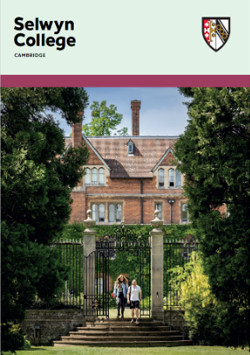The subject at Selwyn
Selwyn has a record of success in the ASNC course and provides strong support for students; Selwyn is known to encourage smaller subjects, which is also an advantage. The College Library holds over 40,000 books, including those most relevant to this subject, and stock is continually updated. The Library also provides a pleasant study area. Teaching in small subjects like ASNC is organised across the university as a whole, and so there is no particular advantage in reading this subject at one college as opposed to another. But as already mentioned, Selwyn is keen to maintain the profile of the smaller subjects to ensure a wide variety of interests represented among its students. Selwyn is also close to the Sidgwick Site, where most ASNC lectures and classes take place, and close to the departmental library and to the University Library.
Teaching Fellows at Selwyn
Our Director of Studies for the ASNC course is Dr Ben Guy, who is an Assistant Professor in Celtic and teaches medieval Welsh language and literature from beginners upwards in the Department of ASNC.
Qualities we are looking for
The vital requirements for a successful ASNC student are interest, enthusiasm, commitment, and ability. A student must be eager to get immersed in unfamiliar knowledge, to read widely in the subject, and take pleasure in bringing the material under control; they might wish to develop an expertise in a particular combination of ASNC subjects, for example by choosing mainly Germanic languages and literatures and history, or mainly Celtic ones, but any mix of subjects will, it is hoped, lead to a rewarding experience. The ASNC course is intended to satisfy a general interest in the medieval world, and at the same time to provide a varied and rigorous intellectual training. ASNC students have gone on to a wide variety of professions, including teaching, publishing, banking, museums and library work, journalism, Law and the Civil Service.
Subject requirements
In terms of their A-level subjects, candidates for admission in the ASNC course have varied backgrounds. While we do not have any particular requirements and are simply looking for evidence of academic ability relevant to the course, we would recommend certain subjects for a stronger application – English (language or literature), History or a Language.
Written work
Candidates are asked to send in advance two recent essays written and marked for their school work, if possible on a literary or historical subject. These may be used as a basis for discussion in the interview.
Interviews
There are two separate interviews. One interview will be with the College’s Director of Studies in ASNC alongside another member of staff from the Department of ASNC. This interview will be trying in particular to assess the candidate’s aptitude for the course, and their commitment to the field of study. It can be helpful if the candidate has some idea of the options within the course which they might wish to take, and has done some exploratory reading in those subjects.
You will also have a shorter general interview which is intended to ascertain your motivation in applying for ASNC at Cambridge. This will give us a fuller sense of the maturity of your approach towards academic work, and your general intellectual interests.
October 2024


